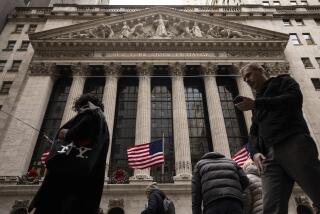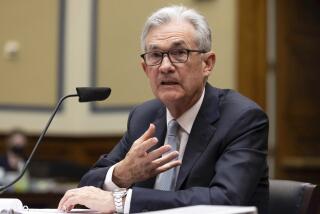Business Economists Forecast Continued Growth
- Share via
WASHINGTON — President Reagan should be able to leave the White House with the U.S. economy still expanding, but the next administration may have to combat a recession during its first year in office, the nation’s business economists predicted Monday.
The National Assn. of Business Economists said that the United States, already enjoying the longest peacetime expansion on record, should have continued economic growth this year and through 1988.
But 56% of the economists surveyed for the report picked 1989 as the most likely year for the next recession to begin. If this forecast proves accurate, it will mean Reagan’s successor will have to deal with a recession during the first year of a new administration.
“While economists continue to push back the expected date of the next recession, they still believe that a downturn will occur before the end of 1990,” said Jerry Jordan, president of the association and chief economist of First Interstate Bancorp of Los Angeles.
Jordan said that the analysts cited rising inflation and higher interest rates as likely causes of the next downturn.
“High interest rates, too little new investment in the U.S. economy and slow long-term productivity growth were mentioned as key forces which could bring about a new economic downturn,” Jordan said.
The recovery from the 1981-82 recession entered its 59th month in October, making this recovery the longest peacetime expansion on record.
The economists predicted that the overall economy, as measured by the gross national product, would expand 3% this year and 2.7% next year.
Both those rates would be up substantially from the 2.2% growth turned in during 1986.
The forecast for this year is very close to the Reagan administration’s estimate that the economy will grow 3.2% this year. However, for 1988, the Administration is expecting even faster growth of 3.5%.
The economists’ views about economic growth have changed little over the past year, but they have been forced to boost their predictions for inflation, based on sharp price rises in the first six months of 1987.
They predicted that consumer prices will rise by 4.5% this year, up substantially from the 1.3% inflation performance of 1986. A year ago, the economists had predicted inflation would increase 3.7% this year.
Reflecting their optimistic growth forecasts, nearly 70% of the economists said the products made by their companies were in increased demand, the highest percentage since the spring of 1984.
The survey of economists’ sentiments was released at the association’s annual convention in New Orleans. Copies of the report were also made available in Washington.
In other predictions, the economists said that unemployment, which edged down to an eight-year low of 5.9% in August, will show little further decline and will still be hovering around the 6% level at the end of 1988.
The U.S. foreign trade deficit, which last year hit a record $156.2 billion, will show virtually no improvement this year, still hanging at $155 billion, the forecasters said. For 1988, they saw the trade deficit shrinking to $140 billion.
The other huge deficit, the federal budget deficit, will shrink to $165 billion this year, after hitting a record $221 billion in 1986, but will start rising again in 1988 because much of the improvement this year will be due to one-time revenues collected because of the new tax law.
For the 1988 fiscal year, the economists forecast an increase in the deficit to $170 billion.
More to Read
Inside the business of entertainment
The Wide Shot brings you news, analysis and insights on everything from streaming wars to production — and what it all means for the future.
You may occasionally receive promotional content from the Los Angeles Times.










